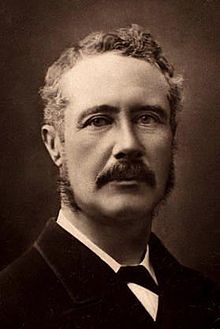Charles "Chinese" Gordon (January 28, 1833 - January 26, 1885)

Major-General Charles George Gordon, CB (28 January 1833 - 26 January 1885), also known as Chinese Gordon, Gordon Pasha, and Gordon of Khartoum, was a British army officer and administrator. In his foreign outposts Gordon surrounded himself with attractive male locals as servants and companions. Back in England he pursued more domestic interests with Lord Arthur Hamilton.
He saw action in the Crimean War as an officer in the British army, but he made his military reputation in China, where he was placed in command of the "Ever Victorious Army," a force of Chinese soldiers led by European officers. In the early 1860s, Gordon and his men were instrumental in putting down the Taiping Rebellion, regularly defeating much larger forces. For these accomplishments, he was given the nickname "Chinese" Gordon and honors from both the Emperor of China and the British.
He entered the service of the Khedive in 1873 (with British government approval) and later became the Governor-General of the Sudan, where he did much to suppress revolts and the slave trade. Exhausted, he resigned and returned to Europe in 1880.
Then a serious revolt broke out in the Sudan, led by a Muslim reformer and self-proclaimed Mahdi, Muhammad Ahmad. Gordon was sent to Khartoum with instructions to secure the evacuation of loyal soldiers and civilians, and depart with them. After evacuating about 2,500 British civilians he retained a smaller group of soldiers and non-military men. As an ardent Christian evangelist he was determined to stand up to the Mahdi, his Muslim nemesis. In the build up to battle the two leaders corresponded attempting to convert the other to their respective faiths, but neither would comply. Besieged by the Mahdi's forces, Gordon organized a city-wide defense lasting almost a year that gained him the admiration of the British public, though not the government, which had not wished to become involved (as Gordon had known before setting out). Only when public pressure to act had become too great was a relief force reluctantly sent. It arrived two days after the city had fallen and Gordon had been beheaded.
The manner of his death is uncertain but it was romanticized in a popular painting by George William Joy - General Gordon's Last Stand (1885, currently in the Leeds City Art Gallery), and again in the film Khartoum (1966) with Charlton Heston as Gordon.
Gordon was killed around dawn fighting the warriors of the Mahdi. As recounted in Bernard M. Allen’s article "How Khartoum Fell" (1941), the Mahdi had given strict orders to his three Khalifas not to kill Gordon. However, the orders were not obeyed. Gordon died on the steps of a stairway in the northwestern corner of the palace, where he and his personal bodyguard, Agha Khalil Orphali, had been firing at the enemy. Orphali was knocked unconscious and did not see Gordon die. When he woke up again that afternoon, he found Gordon's body covered with flies and the head cut off. Reference is made to an 1889 account of the General surrendering his sword to a senior Mahdist officer, then being struck and subsequently speared in the side as he rolled down the staircase. When Gordon's head was unwrapped at the Mahdi's feet, he ordered the head transfixed between the branches of a tree "...where all who passed it could look in disdain, children could throw stones at it and the hawks of the desert could sweep and circle above." After the reconquest of the Sudan, in 1898, several attempts were made to locate Gordon's remains, but in vain.
Many of Gordon's papers were saved and collected by two of his sisters, Helen Clark Gordon, who married Gordon's medical colleague in China, Dr. Moffit, and Mary, who married Gerald Henry Blunt. Gordon's papers, as well as some of his grandfather's (Samuel Enderby III), were accepted by the British Library around 1937.
Source: http://en.wikipedia.org/wiki/Charles_George_Gordon
Further Readings:

Chinese Gordon, the Uncrowned King, His Character As It Is Portrayed in His Private Letters by Charles George Gordon and Laura Carter Holloway
Paperback: 44 pages
Publisher: Ulan Press (June 5, 2011)
Amazon: Chinese Gordon, the Uncrowned King, His Character As It Is Portrayed in His Private Letters
This book was originally published prior to 1923, and represents a reproduction of an important historical work, maintaining the same format as the original work. While some publishers have opted to apply OCR (optical character recognition) technology to the process, we believe this leads to sub-optimal results (frequent typographical errors, strange characters and confusing formatting) and does not adequately preserve the historical character of the original artifact. We believe this work is culturally important in its original archival form. While we strive to adequately clean and digitally enhance the original work, there are occasionally instances where imperfections such as blurred or missing pages, poor pictures or errant marks may have been introduced due to either the quality of the original work or the scanning process itself. Despite these occasional imperfections, we have brought it back into print as part of our ongoing global book preservation commitment, providing customers with access to the best possible historical reprints. We appreciate your understanding of these occasional imperfections, and sincerely hope you enjoy seeing the book in a format as close as possible to that intended by the original publisher.
More LGBT History at my website: www.elisarolle.com/, My Ramblings/Gay Classics
This journal is friends only. This entry was originally posted at http://reviews-and-ramblings.dreamwidth.org/3434304.html. If you are not friends on this journal, Please comment there using OpenID.